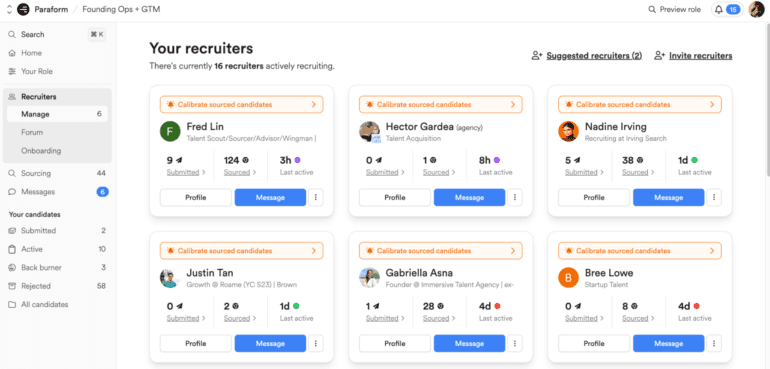- Paraform, a startup recruitment platform, raises $3.6 million in seed funding led by A*.
- Focuses on connecting startups with laid-off recruiters turned entrepreneurs.
- Platform charges listing and success fees for job placements.
- Already onboarded thousands of recruiters and served over 200 companies.
- Plans to expand operations across the U.S. and enter new international markets.
- Diversifying services beyond software engineering to other industries.
- Leverages AI to enhance the human-centered recruitment process.
Main AI News:
In the wake of layoffs, attention often gravitates towards impacted employees, yet the fate of recruiters, who are sometimes casualties of these corporate decisions, remains largely unspoken. Throughout 2022 and 2023, as tech firms slashed their workforce, up to half of their recruitment teams faced similar fates.
Paraform, a dynamic recruitment platform tailored for startups, perceives an untapped opportunity within this upheaval. Recognizing the potential of recruiters venturing into entrepreneurship post-layoffs, Paraform aims to facilitate connections between these seasoned professionals and startups seeking talent. To propel this vision forward, the company recently concluded a $3.6 million seed funding round, spearheaded by A*, a venture capital firm led by Kevin Hartz, known for his roles in Eventbrite, Xoom, and Airbnb.
John Kim, CEO of Paraform, emphasized the significance of this initiative, stating, “During the 2022 and 2023 wave of tech layoffs, we saw 100,000 recruiters laid off, driving many recruiters to go independent and start their own recruiting business.” He continued, “This has left many independent recruiters with valuable skill sets and high-quality networks available and open to new ways of working.”
Currently, Paraform boasts thousands of recruiters on its platform, having facilitated the hiring process for over 200 companies. The platform operates on a model where startups pay a listing fee to publish job openings and a success fee upon making a hire. Kim elucidated, “The listing fee ensures buy-in from startups to the two-way marketplace and a commitment to the recruiters they’re working with.”
Beyond catering to startups, Paraform collaborates with in-house talent teams, enabling them to tap into recruiter networks without the overhead of full-time hires. This flexibility resonates with over 50% of Paraform’s clientele, which includes both early-stage ventures and established enterprises.
The recent funding infusion, raising Paraform’s total capital to $5 million, arrives on the heels of its pre-seed raise in March 2023. Since then, Paraform has witnessed a remarkable surge in revenue, recording a tenfold increase, onboarding over 100 new customers, and expanding its team.
Evan Moore, co-founder of DoorDash, and executives from Affirm, Hightouch, Palantir, and Ramp joined the seed round as investors, alongside Primer Sazze Partners, a previous backer. With these funds, Paraform aims to scale its operations across the U.S., bolster its engineering and operational capabilities, and explore entry into new international markets.
Kim affirmed, “We’re excited to expand globally, building upon our successful ventures in the EU, Korea, and Australia.” Additionally, Paraform is diversifying its services beyond software engineering and go-to-market roles, venturing into domains such as research, science, manufacturing, and defense.
Central to Paraform’s ethos is the belief that recruitment is fundamentally a human-centered process, augmented by technology. Leveraging AI, Paraform seeks to streamline the hiring process, empowering recruiters with insights into candidate preferences and facilitating informed decision-making.
Conclusion:
Paraform’s successful seed round signifies a growing trend in the market where startups recognize the value of leveraging laid-off recruiters’ expertise. This investment not only highlights the potential for innovative solutions in the recruitment sector but also underscores the importance of human-centric approaches augmented by technology in addressing evolving hiring needs.

